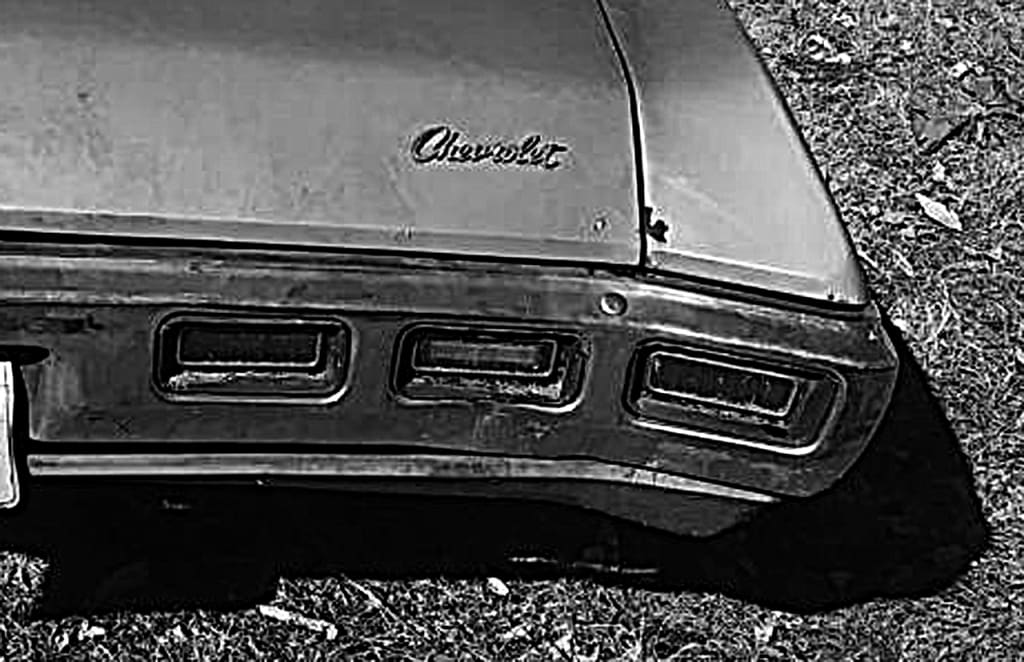
When Sandy held steady at forty-five miles per hour down Westmore Avenue, she could make all seven green lights between America Thinks, Inc. and Kid'n'Kaboodle. Cars on either side flew by. Those on her tail downshifted, gave their engines a throaty roar and swung into the passing lane. She pulled even with them at each light as they punched it again from a standstill.
It wasn't so much that she was a level-headed driver, but that Stephen X had never gotten around to fixing the Impala. Between the engine's knock and rattle and the slip in the transmission, she could have used an hourglass to check her zero-to-sixty performance. Once she built up a head of steam, she was loathe to slow down.
Depending on what point in the light cycle she merged with the Westmore traffic, things could get pretty scary. Forty-five would carry her through, but if she came up on the first light just as it turned green, she would be in for a bad time. Each succeeding light would change on cue, but she would arrive at it before the last clutch of traffic had cleared.
The drivers who cursed her an eighth of a mile earlier took one shocked glance in the rear view mirror and then tromped on the gas when they saw her patchwork grille bearing down on them.
Sandy worried about it even more than they did because they had no idea how bad her brakes were. But she hoped that if some guy had just dropped thirty grand on a gleaming, over-powered phallic symbol with personalized plates, he'd make sure he got out of her way in time.
She drove Westmore Avenue ten times a week; once each way, Monday through Friday. She hardly even noticed anything but the color of the lights. Block after block of convenience stores, gas stations, pawn shops and car lots faded into oblivion. Billboards changed as slowly as the seasons. Even the pedestrians seemed the same, day after day, week after week, always waiting on the same corners, always wearing the same clothes.
She thought how much her life was like the drive down Westmore. Surrounded by frenzied people, she remained totally isolated. She geared every thought and action toward moving so smoothly that she would not cause the slightest disturbance to anyone else's plans—she'd even pray to become invisible if that would help. Her route was straight and unvarying. Only a construction gang or a pile up could move her from her lane.
Every inch of the way, her stomach knotted around the certainty that she would get a ticket or that the Impala would finally die in a cloud of smoke and a pool of stinking oil, tying up traffic for hours.
So Sandy battled her nerves as each light turned into a life-or-death crisis. Her knuckles turned white on the wheel. She thought about unrelenting stress and what it can do, what it did to her grandmother.
As Sandy was growing up, Mama Gore lived in a tiny Airstream trailer in back of their house. She had tacked skirting around its base and built a couple of wooden steps rising to the door. A green-and-white striped canvas awning shaded the south side of the trailer and the single painted chair beneath the window. A pale yellow picket fence set the Airstream's tidy little lawn off from the long, narrow garden where she planted tomatoes, beans, onions and corn.
Every morning, Mama Gore wore a floppy straw hat and one of her faded floral dresses as she worked the garden. She stooped there for hours, loosening the soil's dark, rich aroma, or uprooting the first green hint of a weed.
The old woman gave Sandy the only comfort she ever found in her family. Sandy would wipe the crumbs of dirt from her knees and sit next to Mama Gore's chair. Sometimes while she listened to the stories, she would pluck a blade of grass and shred it to make a tiny spray of green fibers. Sometimes, she would prop Jennifer up and translate Mama Gore's stories into the special, lilting language that only the Gore sisters understood.
Mama Gore was nearly deaf, so she knew nothing about Jennifer's secret language. And the girls' parents refused to hear of it. Sandy always remembered the time she'd hurried to tell her father about her baby sister's invention.
"Jennifer made up a language," Sandy panted as she rushed over to Jack Gore's recliner one Saturday morning.
"Jennifer's only two." Gore held up his newspaper. He brought his hands slowly together to turn the page, and then shook out the crease. "She doesn't even know English yet."
"We learned in school about kids who know what day of the week any date will come on in any year until the end of time. Maybe Jennifer's like that. Maybe she could be on TV. Come and listen."
"Not now, princess."
"Come on, daddy, you've got to hear it."
Her father leaped to his feet, dumping the family, sports and business sections of the paper out of his lap. "I don't have to do anything, you little bitch."
He wrapped the world news around her head and rubbed it back and forth over her ears.
"You're just like your mother. All of you kids are just like your God damned mother."
Through the paper, Sandy felt a hand shove her to the floor. She heard her father storm up the stairs.
Sandy could hardly believe that her father was Mama Gore's son. His temper and abruptness, the whiff of gin, the way he laughed like it was something he'd learned from a book—all of the things that made him her father—were absent in Mama Gore.
Mama Gore, with skin like pink lace, must have known her days were numbered. Yet she had infinite patience, while Jack Gore had none. The old woman's hearing and sight were just about gone, as if years of use had depleted them. Meanwhile, Sandy's father could spot a crumb in a carpet pile or hear a giggle from the far end of the house, but the keenness of his senses did nobody any good.
Sandy built her life on certainties. She found a strange comfort in the knowledge that punishment would always be as swift as it was capricious. As surely as the sun would rise, she knew she would be guilty of some crime that day. Her mother would rant over some detail in her appearance. Her father would speak of her as if she weren't even there. And Mama Gore would tell her wonderful stories from a time before Sandy's parents were born.
Mama Gore worked for the railroad when she was a willowy, beautiful young woman. She told Sandy how she used to stay up all night so that she could throw the switch that moved the track after the 3:17 came through.
She could never see the engineer in the dark. The freight crept through the yards as a powerful hulking shadow that seemed to have nothing to do with the puny concerns of men or this earth. The rails rose and fell with its passage. The metal groaned as a young woman huddled by the stove in the switchman's shack.
Sandy's grandmother supported herself at a time when young women were not expected to do that. But the job cost her daylight. Late in life, she took up gardening and tried to collect on the sun's long-standing debt to her. It was at a time when old women were not expected to do that.
With her failing eyesight, Mama Gore fell prey to Mick Long and a couple of his slick-headed pals. Every morning through the summer, or any day when they were ditching school, they would hide behind the back hedge and toss pebbles into her garden. She would see the stones, or hear them, or sometimes even feel them rain down on her, but she could never tell where they came from. It wasn't so much the mystery or even the potential for injury that bothered her. It was just so much work to pick them out of her neat rows of dirt. The garden lost its pleasure for her.
Sandy caught the teenagers in the act one day. She tried to tell her grandmother what had been happening, but she couldn't make herself understood. Mama Gore slumped into her chair and fanned herself until she fell asleep. The next day, her tormentors were back.
Long got himself suspended from school that spring for carrying a switchblade. That gave him plenty of time to toss stones over the bushes. Mama Gore's cheeriness began to fade. She developed a twitch in her left eyelid that had nothing to do with age.
When Sandy heard the hail begin on the day of the tornado, she looked out the back window in time to see Mama Gore stumble out the Airstream's little door. The woman's straw hat took flight. The long silver hair that she sometimes let Sandy braid whipped across her face.
"Take me, if you want me so bad," Mama Gore shouted. The wind carried her voice to Sandy in the house as if she were standing at her side. The old woman waved her fist against the black sky. "Just take me, if that's what it is."
A sheet of lightning framed her just as the wind shattered the glass in Jennifer's bedroom. Sandy ran to answer her sister's cries, with no idea that she would never see her grandmother again.
_________________________
Go back to Chapter 1 of Stress Test.
Read the next chapter.
_________________________
Complete novel is available on amazon.com.
About the Creator
Alan Gold
Alan Gold lives in Texas. His novels, Stress Test, The Dragon Cycles and The White Buffalo, are available, like everything else in the world, on amazon.






Comments
There are no comments for this story
Be the first to respond and start the conversation.